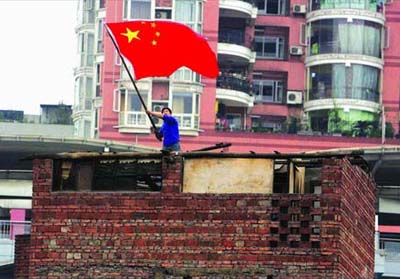A house that has occupied land on a construction site in
Jiulongpo District, Chongqing Municipality, for the last two years
is now at the center of a legal wrangle between its owners and the
Chongqing District Court. On Monday, the court ordered the
occupants of the house to vacate it by Thursday, after which the
house was to be pulled down. However, the house was reportedly
still standing as of Friday.
The owners of the house have vowed to defend their rights to
their property at all costs. In a melodramatic show of their
conviction, they flew the national flag.
The case has caused a major stir in academic and civic circles.
Photos of the two-story house are being circulated on the Internet
after an anonymous netizen uploaded them in early March. The family
that owns and lives in the house has even earned for itself the
title of "the greatest dingzihu in China".
"Dingzihu" describes people who refuse to vacate their premises,
in spite of government orders, until they are assured of adequate
compensation from either the government or property developers
wanting to use their land.
In this particular case, there are plans to build a large
business center on the land. Two hundred and eighty other families
moved out of their houses soon after construction started in
September 2004. All their houses were subsequently torn down.
This one remaining house now stands on its own atop a
20-meter-high mound in the middle of a gigantic construction site.
A sales representative with Weilian Real Estate Company, the
developers of the project, said that the second phase of the
building project has already started.
Yang Wu, the 51-year-old owner of the house, had reportedly
asked for 20 million yuan (US$2.56 million) in compensation from
the developers, according to the Southern Metropolis
Daily.
Yang's wife, Wu Ping, told China Central Television that this
was totally untrue.
"We didn't ask for that amount of money. We only hoped to be
compensated with a same-sized apartment at the original location on
the same floor and with same exposure to the sun, as well as a
temporary residence and shop space," Wu said. The developers have
reportedly not given the Yangs what they want.
A famous snack street stood on the current site years ago. Wu's
family used to run a restaurant business from home. Wu added that
they used to make thousands of yuan a year until 1993, when they
found out that the area was to be cleared.
Nearby residents told reporters that the house has been
uninhabited since September 2004, but Wu explained this was because
the developers cut off their water and electricity supply.
Authorities have reportedly said that the Yangs' demand was
neither in accordance with the law nor realistic. The developers
claim that numerous negotiations with the Yang family have come to
naught.
Wang Wei, manager of the development department, told
Shenzhen Daily that Wu would not sign any agreement
although she was aware of the conditions that the developers were
willing to offer. "We've now invested 300 million yuan (US$38.79
million) into the project. We will suffer huge losses if this
matter remains deadlocked."
The house is estimated to be worth about 2.47 million yuan
(US$319,414). The developers reportedly promised the family 3.5
million yuan (US$452,612) in order to entice them to move out
sooner. The Jiulongpo district house regulator ruled on January 11
that the family would receive a house in another area after they
moved out. Wu ignored the ruling, which prompted the regulator to
apply for an order to have the house demolished.
Ren Qiuping, the director of Jiulongpo District's relocation
department, said the family should defend their rights but should
not ask for more than what is reasonable by law. "They asked for a
same-sized apartment at the original location on the same floor and
with same exposure to the sun, which is impossible. And no law can
guarantee this for them. And according to the city's plans, a
shopping mall will be built where their house now stands, each
floor covering 5,000 square meters. It is not possible to give the
huge space to them since their house is only 219 square-meters. We
have provided them with several alternatives, all of which they
have rejected. We don't know why."
 |
Flying the national flag has come to represent a defense of
civil rights. In addition to flying the flag high, the Yangs
brandished certificates, law books and copies of statutes,
including the Constitution of the People's Republic of China. Wu
said: "We don't want to be 'dingzihu', but we will compromise our
legal rights. We have been fighting this for three years!"
She also claimed that the court order was illegal. "The
Constitution and the latest Property Law protect private property
ownership. They said they were going to demolish our house because
it is in the public interest. But they are going to build a
shopping center, which has nothing to do with the public interest!
It is a business move, and what the court ruling protects are the
developers' interests!
"We only want justice... all I want is to negotiate with the
developers in a fair environment," She added.
However, Professor Jiang Ping, the former president of China
University of Political Science and Law who led the team that
drafted the newly approved Property Law, refuted Wu's claims. "She
is not in a position to judge what is or isn't in the public
interest," he told China.org.cn. "If the compensation is legal and
reasonable, they should move out; if they don't think so, they may
file lawsuits and take this issue to court."
(China.org.cn by Zhang Rui March 23, 2007)